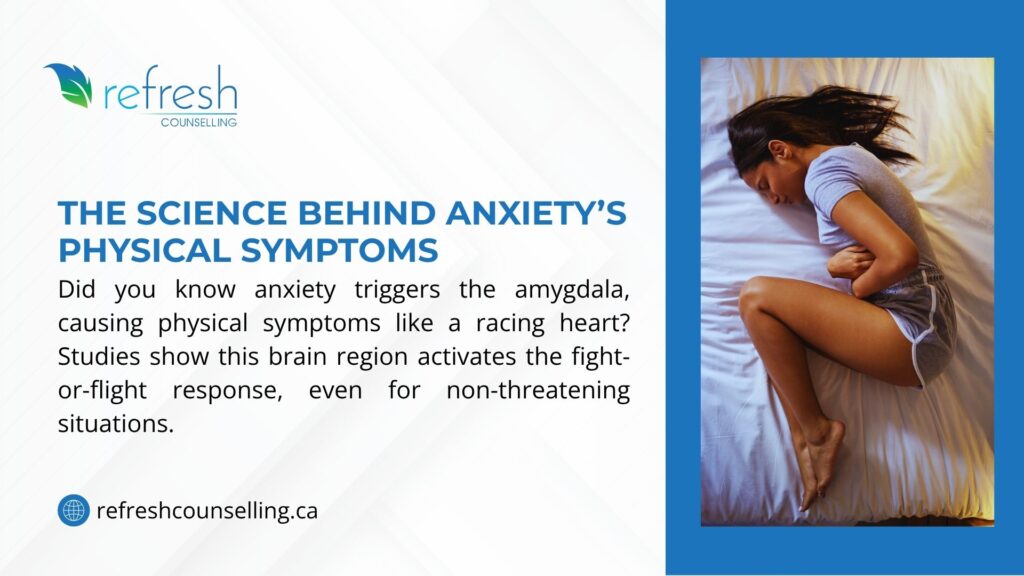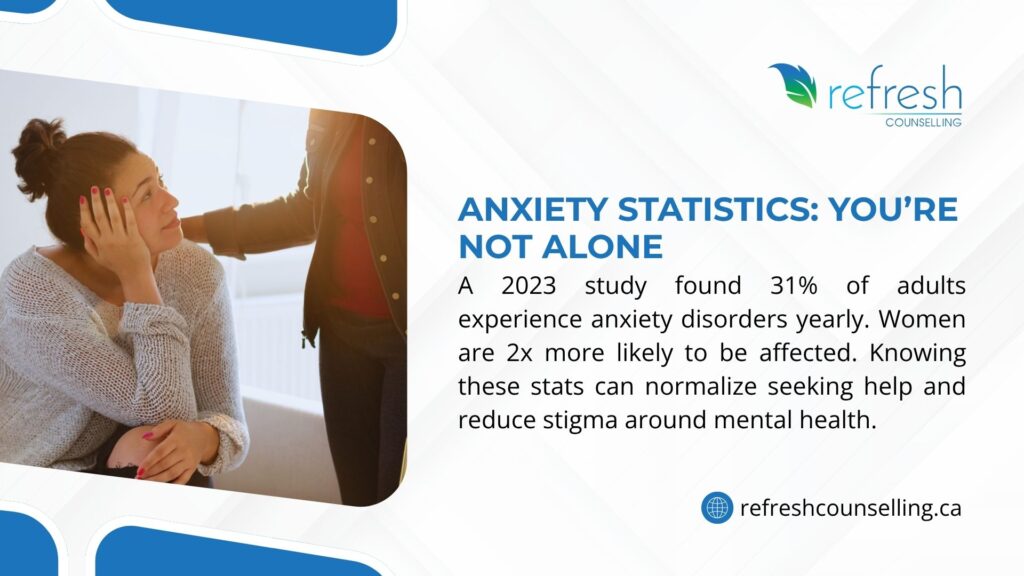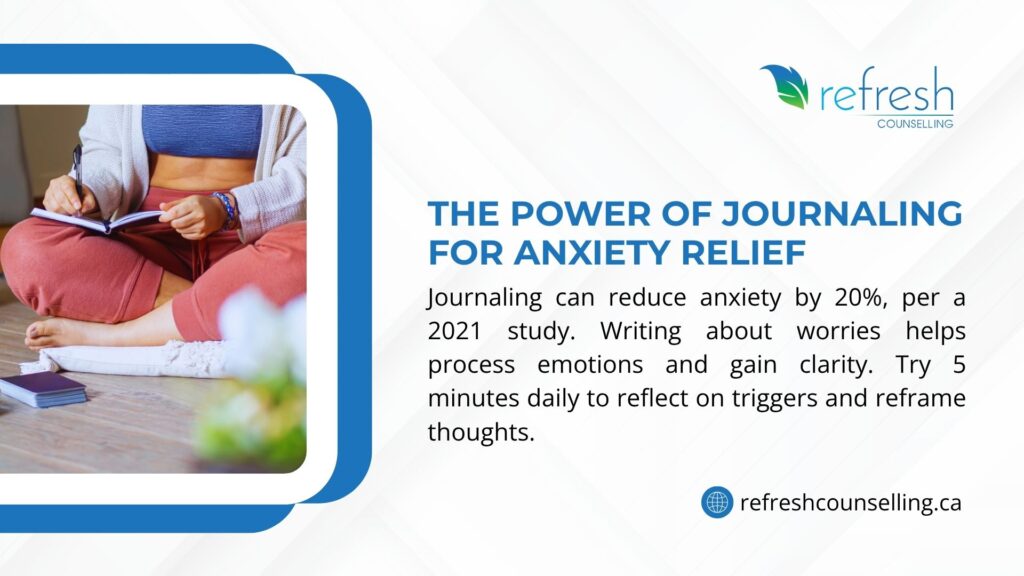If you’re reading this, chances are you’ve already googled “how to deal with anxiety” and found the same recycled advice everywhere. Deep breathing! Mindfulness! Think positive thoughts!
But what happens when you’re having a panic attack in the Target checkout line and some random person tells you to “just breathe”? That’s not so helpful.
Anxiety can hit you over the smallest things – like worrying for three hours about whether you said “you too” when the cashier said “have a nice day”. Or it shows up at 2 AM to remind you about that embarrassing thing you did in seventh grade.
Why Your Brain Does This Annoying Thing
Your brain basically hasn’t gotten the memo that we’re not cave people anymore. It still thinks that getting an email from your boss marked “urgent” is the same level of threat as a saber-toothed tiger. So it floods your system with stress hormones and you end up feeling like you need to run a marathon when all you need to do is respond to a meeting request.
The physical stuff makes more sense when you think about it this way. Your heart races because your body thinks you might need to sprint away from danger. You get sweaty because your system is preparing for action. Your stomach feels weird because digestion isn’t a priority when you’re supposedly about to die.
Except you’re not about to die. You’re just standing in line at Starbucks, wondering if you pronounced “macchiato” wrong.
Sometimes your anxiety is actually onto something. Your emotions might not be problems you need to fix immediately – they could be trying to tell you something important. Maybe you’re anxious about that job interview because you actually don’t want the job. Maybe Sunday anxiety means your work situation genuinely sucks.
What Anxiety Feels Like
Everyone talks about anxiety like it’s just “feeling worried,” but it’s so much weirder than that.
Sometimes it’s physical first – your chest gets tight for no reason, or you suddenly feel like you can’t get enough air. Your hands might shake or get clammy. Some people get dizzy or feel like they’re not quite connected to their body.
Then there’s also a mental anxiety where your brain starts playing the worst possible scenario on repeat. You know that thing where you send a text and the person doesn’t respond immediately, so you convince yourself they hate you? That’s anxiety.
The behavior changes are probably the most annoying part. You start avoiding phone calls. You check your email seventeen times in five minutes. You lie awake analyzing every conversation from the day.
| Physical Weirdness | Mental Chaos | Acting Weird |
| Heart doing backflips | Thoughts that won’t stop | Avoiding people |
| Can’t breathe right | Everything feels catastrophic | Checking stuff obsessively |
| Stomach doing cartwheels | Brain fog | Canceling everything |
| Shaky hands | Feeling disconnected | Not sleeping |
Things That Can Help Ease Your Anxiety
When anxiety hits and you need to chill out, here’s what might actually help instead of the usual “just relax” nonsense.
Box Breathing (But Make It Work for You)
Forget the perfect 4-4-4-4 count that everyone talks about. Just focus on making your exhale longer than your inhale. In for 3, out for 5. Or in for 4, out for 6. Whatever doesn’t make you feel like you’re suffocating. The longer exhale tells your nervous system to calm down.

Ground Yourself in Reality
When anxiety takes over, you’re basically trapped in your head with your worst thoughts. The 5-4-3-2-1 technique pulls you back into your actual body in your actual location.
Five things you can see right now. Four things you can touch. Three things you can hear. Two things you can smell. One thing you can taste.
It sounds stupid, but it works because it forces your brain to notice what’s actually happening instead of what might happen.
Move Your Body Somehow
Anxiety creates this restless energy that needs somewhere to go. Walking around helps, even if it’s just pacing in your room. Stretching works. Some people do jumping jacks in their bathroom. The point is giving your body something to do with all that fight-or-flight energy.
Preventing Anxiety (Sort Of)
You can’t prevent anxiety completely because life is unpredictable and your brain is dramatic. But you can make it less likely to completely take over your day.
Figure Out Your Triggers
Start paying attention to what sets you off without judging yourself for it. Maybe it’s always worse when you haven’t eaten in a while. Maybe it spikes after you drink coffee on an empty stomach. Maybe it gets bad during certain seasons or after scrolling social media too much.
Once you know what makes it worse, you can plan around some of those things. Not all of them, but some.
Create Some Routine
Anxiety loves unpredictability, so having some regular things in your day can help. This doesn’t mean scheduling every minute or becoming obsessive about routines. More like having a few reliable anchor points.
Maybe you always make your bed in the morning. Maybe you have the same breakfast most days. Maybe you take ten minutes to sit quietly before you check your phone. Small stuff that signals to your brain that things are relatively stable.
Take Care of Your Body
Getting decent sleep, eating regularly, and moving around actually make a difference with anxiety. Not because you need to be perfect about health stuff, but because when your body is running on fumes, everything feels harder.
You don’t need to become a wellness influencer. Just notice if you feel worse when you’re surviving on energy drinks and anxiety, or if staying up until 3 AM scrolling makes everything feel impossible the next day.

When You Need Professional Help
Sometimes you can’t manage anxiety on your own, and that’s completely normal. If it’s messing with your sleep, your relationships, your work, or if you’re avoiding important stuff because of it, it’s probably time to get some backup.
Getting therapy for anxiety doesn’t mean you failed at handling it yourself. It means you’re smart enough to use available resources. You can actually go from anxiety controlling your life to understanding it better and feeling more empowered.
Therapists who specialize in anxiety have tools and techniques that most people don’t know about. They can help you figure out what’s going on with your specific situation and teach you strategies that actually work for your brain.
Stop Trying to Eliminate It Completely
Fighting anxiety usually makes it worse. It’s like trying not to think about a pink elephant. The harder you try not to be anxious, the more anxious you get.
Instead of declaring war on your anxiety, try getting curious about it. What is this feeling trying to protect you from? What does it think you need to know?
This doesn’t mean accepting anxiety that’s ruining your life. But maybe instead of getting angry at yourself for feeling anxious, you can ask what your brain is so worried about and whether that worry is actually helpful right now.
Sometimes anxiety points to real problems. Sometimes it’s just your brain being dramatic about normal life stuff. Either way, being curious instead of combative tends to work better.

Find What Works for You
Everyone’s different. Maybe meditation makes your anxiety worse because sitting still with your thoughts is torture. Maybe exercise helps, or maybe it makes you more jittery. Maybe you need to talk it out with friends, or maybe you need to hide in your room and watch Netflix.
Don’t try to fix everything at once because that’s just more pressure you don’t need. Pick one thing that seems doable and see how it goes. The goal isn’t becoming someone who never feels anxious – that person doesn’t exist anyway.
It’s more about having a few tricks up your sleeve for when anxiety shows up, and knowing you can handle it when it does.
If you’re tired of managing anxiety alone and the internet advice isn’t cutting it anymore, you don’t have to keep struggling by yourself. Refresh Counselling understands that anxiety is a real thing that affects real parts of your life.
We can help you figure out what’s going on with your specific brand of anxiety and give you tools that work for how your particular brain operates. You don’t need to have everything figured out before you call us. Sometimes the best place to start is just talking to someone who knows what they’re talking about.
